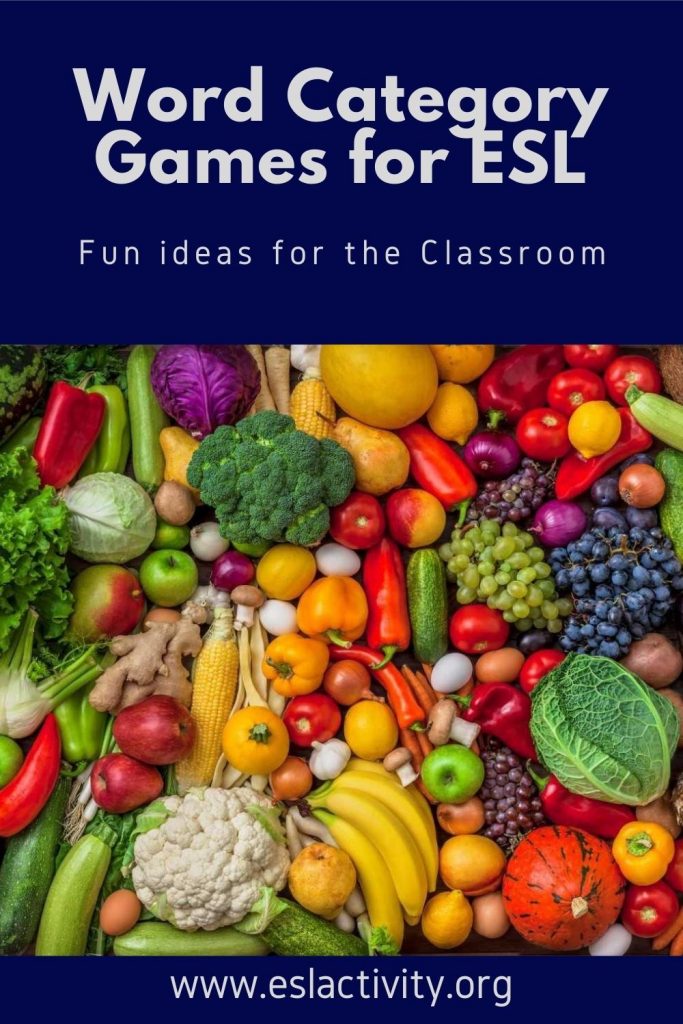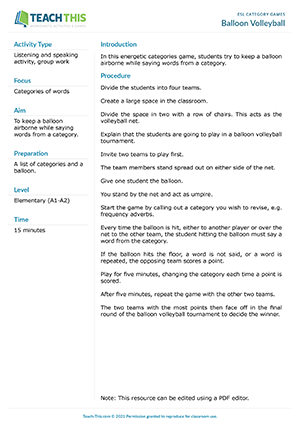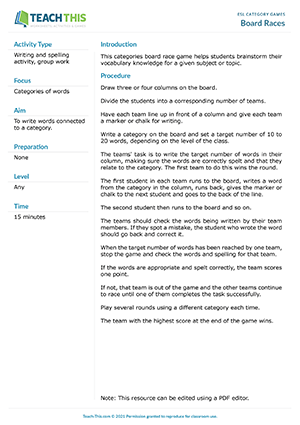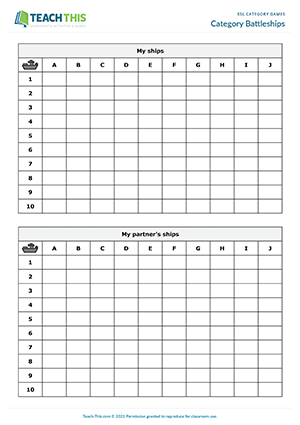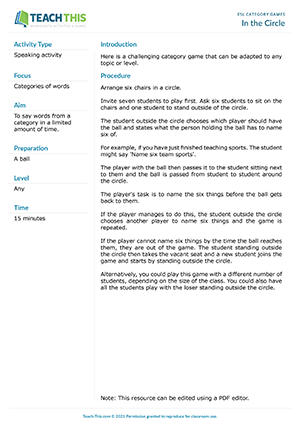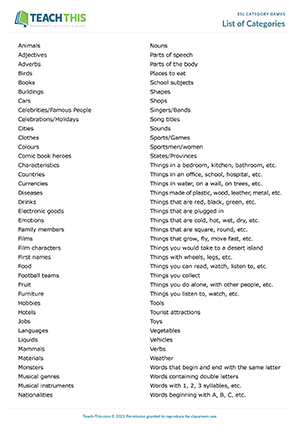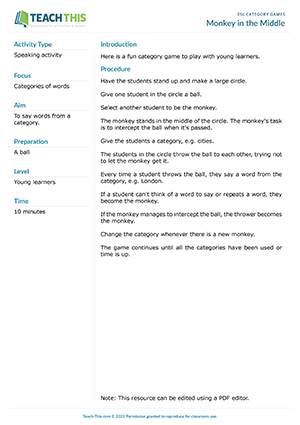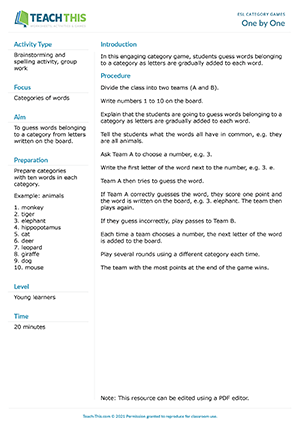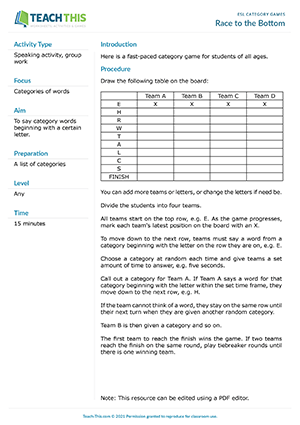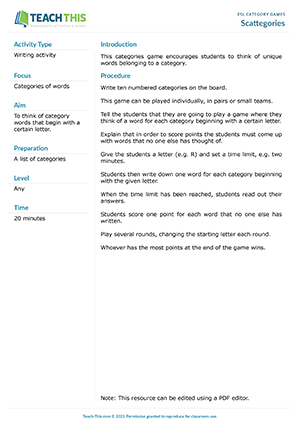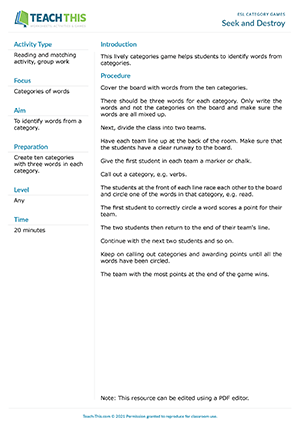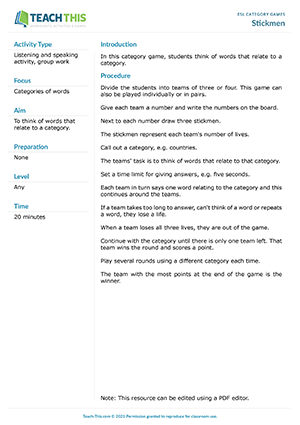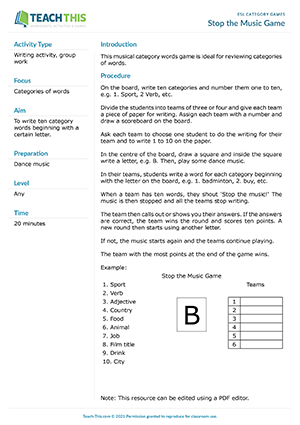If you’re looking for some ESL games and activities for word categories, then you’re certainly in the right place. Keep on reading for the top 15 that are engaging, interactive and student-centred and can be used for vocabulary categories (jobs, animals, etc.) or various kinds of grammar (past tense verbs, adjectives, etc.).
Word categories ESL games
Word Category Activities and Games
Let’s get into the best word categories games to use with English learners.
#1: Word Categories Volleyball
Divide the class up into two teams and put a row of desks down the middle. Using a balloon, students take turns hitting it back and forth between the two teams. The person hitting it has to say a word belonging to the category (animals, past tense verbs, adjectives, etc.). No word can be repeated.
If the balloon hits the floor or someone doesn’t say a word, the other team gets a point. Keep playing until a certain number of points is reached.
#2: Word Category Board Race
Divide the class up into teams (2-4, depending on the size of class and space on the whiteboard) and have each team line up in front of the whiteboard with one marker per team. Call out a category (animals, food, verbs, etc.) and the first student has to write a word from that category. Then, they pass the marker to the next student who has to do the same and they return to the back of the line. Continue the game for 1-2 minutes and the winner is the team with the most correct words.
#3: A to Z Alphabet Words Categories Game
Unless you teach absolute beginners, it’s likely that your students already know a bunch of words in any given category. In this case, consider using this as a warmer activity to help students activate their prior knowledge about a topic. Or, use it as a review at the end of class.
The way it works is that in pairs or small groups, students have to write down the alphabet on a piece of paper. Then, students have to write down a word that starts with each letter belonging to that certain category. For example jobs.
A =
B = baseball player
C =
D = doctor
E =
F = fisherman
The team with the most words at the end of the allotted time is the winner. Check it out:
www.eslactivity.org/a-to-z-game
#4: Flyswatter Game
This is a nice game for creating some serious excitement in the classroom! If the word categories are related to vocabulary (jobs for example), then fill the board with a bunch of those. One student from each team comes to the whiteboard and takes a flyswatter. Give some hints about the world and the first student to slap the correct one gets a point for their team. Erase the word and add a new one.
If you’re focusing on categories of words related to grammar and building sentences, then fill the board with nouns, verbs, adjectives, etc. Tell students to find a verb. The first student to slap one gets a chance to make a sentence with that word and if they do, they get a point for their team. Find out more:
www.eslactivity.org/flyswatter-esl-vocabulary-game-for-kids
Category game list
#5: Word Category Concentration
This is a challenging memory game that works well for categories of words. Make up a bunch of matching cards that have a general category and then a specific item. Around 16 is a good number. For example:
- food—apple
- sport—soccer
- job—teacher
- etc.
Then, put students into groups of 3-4 and give each group a set of cards and it essentially becomes a vocabulary and matching memory game. Learn how to do it:
www.eslactivity.org/concentration-an-esl-vocabulary-game
#6: Categories ESL Speaking Lesson
It’s quite easy to plan your own lessons about almost anything. Check out this video for the simple steps to follow:
#7: Word Association
Unless students are absolute beginners, it’s likely that they already know a good amount of vocabulary from a lot of different word categories (animals, jobs, clothing, food, adverbs, adjectives, etc.). If this is the case, doing something like this word association activity can be quite helpful for helping student activate their prior knowledge before jumping into the new stuff.
It’s basically a brainstorming exercise. More advanced, older students can do it in pairs while younger beginners can do it together as a class. Have a look here:
www.eslactivity.org/word-association-an-esl-vocabulary-activity
#8: Memory Circle Word Categories Game
This is a fun memory game that works well for kids. Call out a certain category (jobs) and the first student has to say a word (doctor). The second student says doctor and then adds their own word (truck driver). And so on it continues until someone misses or can’t add their own word. They sit down and are out of the game. Continue until time is up or until 1-2 people are left standing.
#9: Odd One Out
This is a nice word category game to try out with beginners. It can be used for vocabulary or grammatical concepts. Write down groups of four words, one of which doesn’t match:
- doctor, truck driver, hockey, teacher
- go, teach, eat, walked
In this first case, hockey doesn’t fit because it’s not a job. In the second case, walked because it’s a past tense verb. Multiple answers may be possible which I accept as long as students are able to support it with a reason. Check it out:
#10: Word Categories Survey
Just ask my students and they’ll tell you how much I love doing surveys in my classes! They cover a range of skills, get students out of their seats and moving around the classroom and can be used for almost any topic, grammar point or vocabulary set. Of course, it’s possible to use them for any word category (jobs, travel, sports, hobbies, etc.).
The better news is that it’s easy to make your own in just a few minutes once you get some practice with it. Find out how:
www.eslactivity.org/esl-surveys
#11: Ball Toss Word Categories Game
Try out this fun game with kids. Write down a bunch of categories (job, food, city, etc.) using a marker on the beach ball. Then, students toss the ball around the classroom. Whoever catches the ball has to say a word from the category that their right thumb is touching. My rule is that no word can be repeated. Check it out:
www.eslactivity.org/ball-toss-4-skills-esl-activity
#12: Listening for One Specific Word Category
Teaching listening skills can be a bit challenging. However, a way to make it a bit easier for our students is to get them to listen for one specific thing. In this case, it could be to take notes on all the jobs that they hear mentioned. Or, all the examples of past tense verbs. Base it on whatever category of words you’re teaching. More details here:
ESL Listening Activities, Games, Worksheets, and Lesson Plans
#13: Charades
To review words in categories, consider using charades. Have a look at this video for all the details you need to know:
#14: Dictogloss
This is a challenging listening activity for more advanced level students. Find (or write) a passage that contains lots of words from the target category. Then put students into pairs and read it out at a faster than normal pace. Students have to take notes and try to recreate what they just heard.
Read it out again quickly and students do the same thing. Finally, they can compare what they have with the original version. The teacher can highlight the words from a certain category (with the students’ help of course). Check it out:
www.eslactivity.org/dictogloss-esl-listening-and-speaking-activity
#15: Name 5 Things in a Word Category
This is a fast-paced warm-up game that’s ideal for word categories. In groups, students have to write down 5 things that belong to a certain category. Some easy ones are food, animals, things they can see in the classroom, etc. More advanced students can do things like things are good for the environment, things they can see that are yellow, habits that may cause cancer, etc.
The team that finishes first puts up their hands and that round is done.
#16: Appearance Adjectives
A common category of words is adjectives to describe people’s appearance. Here are some of my favourite games and activities:
Appearance Adjectives ESL Activities.
Did you like these Word Categories Games?
Yes? Then you’re going to want to check out this book over on Amazon: 101 ESL Activities for Teenagers and Adults. The key to better English classes is a wide variety of interesting, engaging, and interactive activities and games and this book will help you with just that.
Pick up a copy to keep on the bookshelf in your office to use as a handy reference guide. Or, take the digital version with you on any device to your favourite coffee shop for some lesson planning on the go. Finally, consider listening to the audio version while commuting to work for a serious dose of inspiration for teaching.
Whatever the case, pick up a copy of the book today and get ready some ESL teaching awesome in your life. Head over to Amazon to find out more:
Have your say about Words Categories Games and Activities
What’s your top pick for word categories games? Is it one of the options from this list or do you have another one that you’d like to recommend? Leave a comment below and let us know what you think. We’d love to hear from you.
Also be sure to give this article a share on Facebook, Pinterest, or Twitter. It’ll help other busy English teachers, like yourself, find this useful resource.
Word categories games
Last update on 2022-07-17 / Affiliate links / Images from Amazon Product Advertising API
Shuffle
Girl’s name
Things You Save Up to Buy
Old-fashioned boy’s name
Boy’s name
Something orange
Things in Outer Space
Body part
Animals
Acronyms
Things in a Medicine Cabinet
Country
Things associated with winter

What it is: A very flexible game with lots of adaptations.
Best for: A group of about 4 to 10.
What you need: You’ll need a list of categories (I’ve provided one below) and possibly a timer and pens and paper.
How to play: Basically the challenge is to try and think of as many items in a category as you can. An example category would be fast food.
And items in the category? Chicken nuggets, tacos, hamburgers, hot dogs, French fries, McDonald’s apple pies, chicken sandwiches, and on and on. How many things can you think of?
Variations: There are many different ways you could set up your game. Here’s a few to get you started.
Like the game Scattergories (commission link), you can name as many items in a category that start with the same letter. Choose a letter from the alphabet, draw a category, set a timer, and go! For example, if the category were male names and the letter were C, you could write any of these:
- Carson
- Caleb
- Cole
- Christian
- Connor
- Carter
- Cameron
You can play on teams, individually, or as a whole group. At the end of the game, everyone takes turns reading all their answers aloud, where questionable answers can be submitted to the group to see if they’ll be allowed or not. (For example: “Camille? That’s a girl’s name!” “But I totally knew a guy named Camille once!” “OK, fine, we’ll allow it.”) If you’re playing against each other, the person who writes down the most names wins. (One variation is to have everyone cross off any name that someone else wrote down, too. That way the person with the most unique answers wins.)
You could also play the above version, but without the restriction of a letter of the alphabet. Any boy name, for example, would work for the above example. Then follow the same rules for the rest of the game.
Another variation which works really well for car rides or killing time can be played one word at a time. In this variation, you pick a category and then take turns saying something from that category, one player at a time. The first person who can’t think of a word that hasn’t already been said is out of the game, and you start a new round with a new category. (The game first letter, last letter is an even more challenging variation of this.)
You could of course use your list of categories to play the pool game categories or a similar game.
What other rules or variations can you come up with?
Printables: Here’s the list of categories! It’s a few pages long, so hopefully it gives you lots of categories to choose from for all of your game-playing needs. 🙂
 Categories
Categories
The Categories Game is one of those essential activities that you can pull out of your bag (although no materials are needed) and will nicely fill up a 20-40 minute slot. I’ve played this game with students of all ages and levels and it has always been a success.
This team game is based on the popular party game Scattergories and is perfect for reviewing and reactivating vocabulary you have learnt.
Play Online
If you are teaching online, try this online version of Scattergories .
How to Play the Categories Game
Divide the board into six squares and at the top of each square write a category heading.
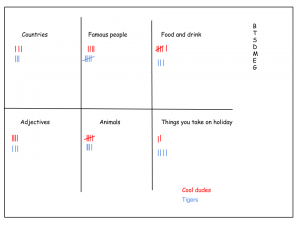
Divide the class into two or three teams and have them think up team names. Give each team a blank sheet of paper and ask them to create an answer sheet by copying the category layout on the board.
Choose a letter of the alphabet. Write it next to your table so you don’t repeat yourself later.
As quickly as possible teams must try to think of a word that fits each category and which begins with the given letter. They should write their answers under the appropriate category on their answer sheet.
For example, if category headings include Animals and Drinks, and the letter you’ve chosen is B, teams might write Bear and Beer in the appropriate categories. The game can be made more difficult by choosing more challenging letters.
As soon as a team has a word for every category they should shout stop! The other team(s) must immediately stop writing and put their pens down.
Take the answers from the first team to finish and give a point for each word that fits correctly, then collect the answers from the other teams and award further points. If there are allegations of cheating you can always check the teams’ answers on their answer sheets. The team with the most points at the end of x rounds is the winner.
One way to score the game is to make marks inside the category square for each correct answer. Either use a different colour for each team or use a different symbol, e.g. I,O,X.
Possible Categories
Here’s a list of categories which you could use when playing the category game.
- countries
- games and sports
- cities
- animals
- food and drink
- verbs
- adjectives
- jobs
- famous people
- things you find in the bathroom/kitchen
- things you take on holiday
- fruit and vegetables
- things that fly
- things that are yellow
- items you can buy in IKEA
- things you find in a refrigerator
- things that are cold
- things you find in an office
- things that are round
- things which are scary
- things to do with Christmas
- things with wheels
- things in the garden
- things you can turn off, etc.
Categories for Kids
Here are some possible categories if you’re playing with younger learners.
- things with wheels
- fruits and vegetables
- games that use a ball
- musical instruments
- types of sweets / candy
- types of weather
- hobbies
- pizza toppings
- things people are afraid of
- movies / movie characters
- tv shows
- drinks
- singers / bands
Balloon Volleyball
ESL Category Game — Vocabulary: Providing Vocabulary — Group Work — Elementary (A1-A2) — 15 minutes
In this energetic categories game, students try to keep a balloon airborne while saying words from a category. Create a large space in the classroom. Divide the space in two with a row of chairs. This acts as the volleyball net. Explain that the students are going to play in a balloon volleyball tournament. Invite two teams to play first. The team members stand on either side of the net. Give one student the balloon. You stand by the net and act as umpire. Start the game by calling out a category you wish to revise, e.g. frequency adverbs. Every time the balloon is hit, either to another player or over the net to the other team, the student hitting the balloon says a word from the category. If the balloon hits the floor, a word is not said, or a word is repeated, the opposing team scores a point. Play for five minutes, changing the category each time a point is scored. After five minutes, repeat the game with the other two teams. The two teams with the most points then face off in the final round to decide the winner.
Board Races
ESL Category Game — Vocabulary and Spelling: Listing — Group Work — Any Level — 15 minutes
This categories board race game helps students brainstorm their vocabulary knowledge for a given subject or topic. Each team lines up in front of the board. Write a category on the board and set a target number of 10 to 20 words, depending on the level of the class. The first student in each team runs to the board, writes a word from the category in the column, runs back, gives the marker or chalk to the next student and goes to the back of the line. The second student then runs to the board and so on. When the target number of words has been reached by one team, stop the game and check the words and spelling for that team. If the words are appropriate and spelt correctly, the team scores one point. If not, that team is out of the game, and the other teams continue to race until one of them completes the task successfully. Play several rounds using a different category each time. The team with the highest score at the end of the game wins.
Category Battleships
ESL Category Game — Vocabulary: Providing Vocabulary, Battleships — Group and Pair Work — Elementary (A1-A2) — 20 minutes
In this entertaining category words game, students play a game of Battleships to find words and name the category the words relate to. Give each group a category on a piece of paper. Working together, students come up with seven words belonging to that category. Students write the words on the grid entitled ‘My ships’ on their worksheet. Next, students pair up with someone from the other group and play a game of Battleships to find out what words their partner has written on their battleship grid and the name of the category the words relate to. Students take it in turns to call out coordinates to their partner, e.g. C4. If there is a letter in that square, their partner says ‘hit’ and reveals the letter. If the square is blank, their partner says ‘miss’. The student then marks the ‘My partner’s ships’ grid accordingly. The first student to find all seven words and say the name of the category the words belong to wins the game.
In the Circle
ESL Category Game — Vocabulary: Naming — Group Work — Any Level — 15 minutes
Here is a challenging category game that can be adapted to any topic or level. Ask six students to sit on the chairs and one student to stand outside of the circle. The student outside the circle chooses which player should have the ball and states what the person holding the ball has to name six of, e.g. ‘Name six team sports’. The player with the ball then passes it to the student sitting next to them and the ball is passed from student to student around the circle. The player’s task is to name the six things before the ball gets back to them. If the player manages to do this, the student outside the circle chooses another player to name six things and the game is repeated. If not, the player is out of the game. The student standing outside the circle then takes the vacant seat and a new student joins the game and starts by standing outside the circle. Alternatively, you could play this game with a different number of students, depending on the size of the class. You could also have all the students play with the loser standing outside the circle.
List of Categories
ESL Categories List
Here is a list of categories for you to use when playing category games.
Monkey in the Middle
ESL Category Game — Vocabulary: Providing Vocabulary — Young Learners — 10 minutes
Here is a fun category game to play with young learners. Students stand up and make a large circle. Give one student in the circle a ball. Select another student to be the monkey. The monkey stands in the middle of the circle. The monkey’s task is to intercept the ball when it’s passed. Give the students a category, e.g. cities. The students in the circle throw the ball to each other, trying not to let the monkey get it. Every time a student throws the ball, they say a word from the category, e.g. London. If a student can’t think of a word to say or repeats a word, they become the monkey. If the monkey manages to intercept the ball, the thrower becomes the monkey. Change the category whenever there is a new monkey. The game continues until all the categories have been used or time is up.
One by One
ESL Category Game — Vocabulary and Spelling Game: Guessing — Group Work — Any Level — 20 minutes
In this engaging category words game, students guess words belonging to a category as letters are gradually added to each word. Write numbers 1 to 10 on the board. Tell the two teams what the words all have in common, e.g. they are all animals. Ask Team A to choose a number, e.g. 3. Write the first letter of the word next to the number, e.g. 3. e. Team A then tries to guess the word. If Team A correctly guesses the word, they score one point and the word is written on the board, e.g. 3. elephant. The team then plays again. If they guess incorrectly, play passes to Team B. Each time a team chooses a number, the next letter of the word is added to the board. Play several rounds using a different category each time. The team with the most points at the end of the game wins.
Race to the Bottom
ESL Category Game — Vocabulary and Spelling: Providing Vocabulary — Group Work — Any Level — 15 minutes
Here is a fast-paced category game for students of all ages. Draw a table on the board with teams at the top and letters down the side as shown in the PDF. All teams start on the top row. To move down to the next row, teams must say a word from a category beginning with the letter on the row they are on, e.g. E. Choose a category at random each time, and give teams a set amount of time to answer, e.g. five seconds. Call out a category for Team A. If Team A says a word for that category beginning with the letter within the set time frame, they move down to the next row. If the team cannot think of a word, they stay on the same row until their next turn when they are given another random category. Team B is then given a category and so on. The first team to reach the finish wins the game.
Scattegories
ESL Category Game — Vocabulary and Spelling: Writing Words — Any Level — 20 minutes
This categories game encourages students to think of unique words belonging to a category. Write ten numbered categories on the board. This game can be played individually, in pairs or small teams. Students then play a game where they think of a word for each category beginning with a certain letter. In order to score points, students must come up with words that no one else has thought of. Give the students a letter (e.g. R) and set a time limit, e.g. two minutes. Students then write down one word for each category beginning with the given letter. When the time limit has been reached, students read out their answers. Students score one point for each word that no one else has written. Play several rounds, changing the starting letter each round. Whoever has the most points at the end of the game wins.
Seek and Destroy
ESL Category Game — Vocabulary: Identifying, Matching — Group Work — Any Level — 20 minutes
This lively categories game helps students to identify words from categories. Cover the board with words from ten categories. There should be three words for each category. Next, each team lines up at the back of the room. Call out a category, e.g. verbs. The students at the front of each line race each other to the board and circle one of the words in that category, e.g. read. The first student to correctly circle a word scores a point for their team. Continue with the next two students and so on. Keep on calling out categories and awarding points until all the words have been circled. The team with the most points at the end of the game wins.
Stickmen
ESL Category Game — Vocabulary: Providing Vocabulary — Group Work — Any Level — 20 minutes
In this category game, students think of words that relate to a category. Draw three stickmen for each team on the board. The stickmen represent each team’s number of lives. Call out a category, e.g. countries. The teams’ task is to think of words that relate to that category. Set a time limit for giving answers, e.g. five seconds. Each team in turn says one word relating to the category and this continues around the teams. If a team takes too long to answer, can’t think of a word or repeats a word, they lose a life. When a team loses all three lives, they are out of the game. Continue with the category until there is only one team left. That team wins the round and scores a point. Play several rounds using a different category each time. The team with the most points at the end of the game is the winner.
Stop
ESL Category Game — Vocabulary: Writing Words — Group Work — Intermediate (B1) — 25 minutes
In this entertaining categories game, students try to write down uncommon category words beginning with a certain letter. Write ten categories on the board. Teams then race to write down one word for each category beginning with a chosen letter. The first team to write a word for every category shouts ‘Stop’ and the other teams stop writing. The teams then give their paper to another team for marking and each team in turn reads out the words on their paper. Words that are not repeated by another team are worth five points. Words repeated by two teams are worth two points. Words repeated by three or more teams are worth one point. Play several rounds. The team with the most points at the end of the game wins..
Stop the Music Game
ESL Category Game — Vocabulary: Providing Vocabulary — Group Work — Any Level — 20 minutes
This musical category words game is ideal for reviewing categories of words. On the board, write ten categories and number them one to ten, e.g. 1. Sport, 2 Verb, etc. In the centre of the board, draw a square and inside the square write a letter, e.g. B. Then, play some dance music. In their teams, students write a word for each category beginning with the letter on the board, e.g. 1. badminton, 2. buy, etc. When a team has ten words, they shout ‘Stop the music!’ The music is then stopped and all the teams stop writing. The team then calls out or shows you their answers. If the answers are correct, the team wins the round and scores ten points. A new round then starts using another letter. If not, the music starts again and the teams continue playing. The team with the most points at the end of the game wins.


